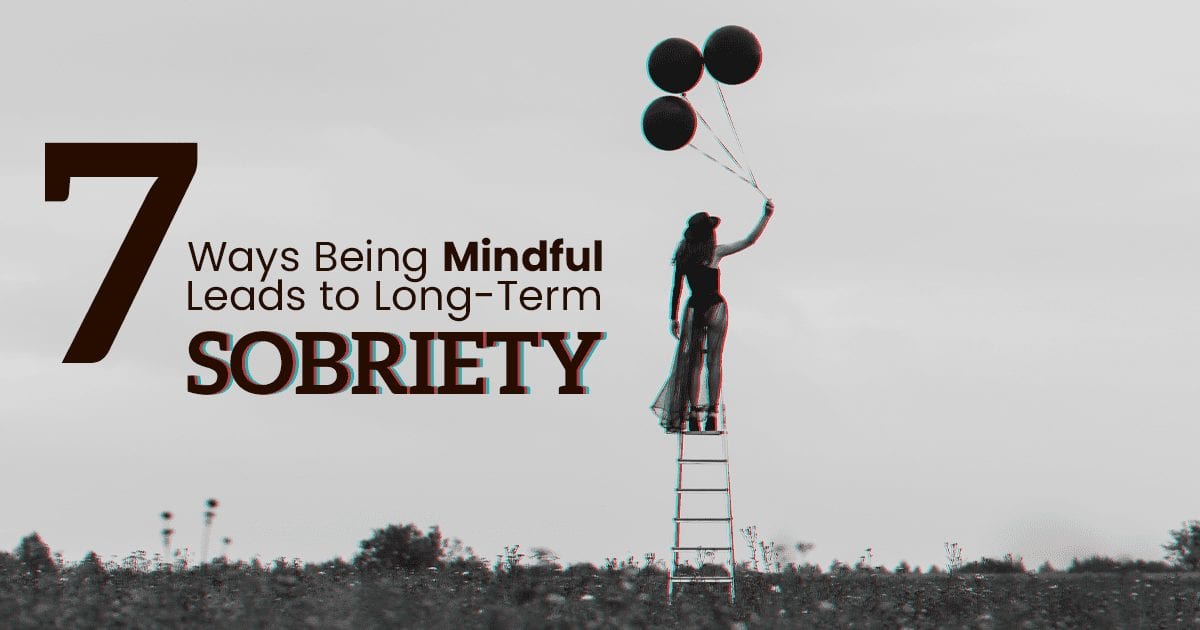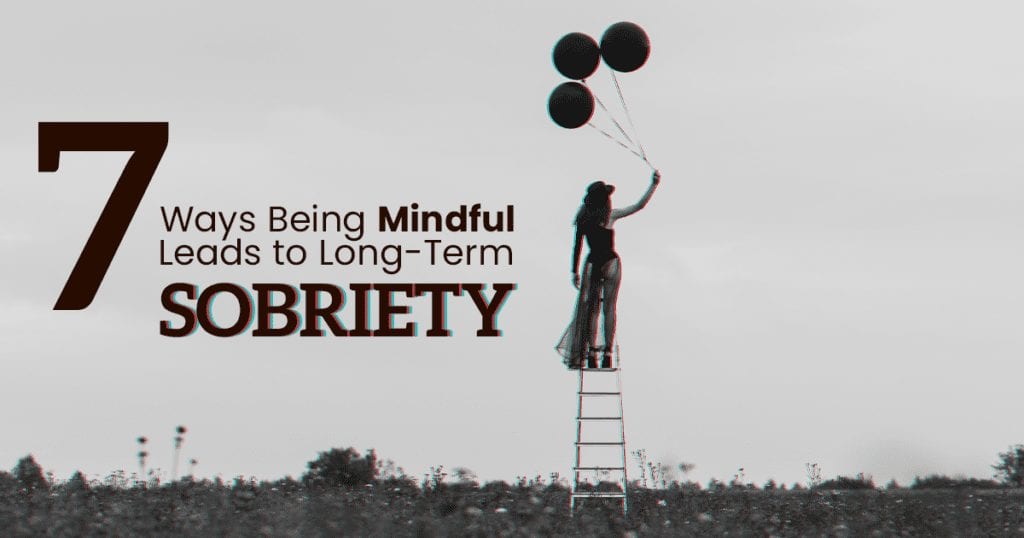

The practice of being mindful can be a valuable ally in maintaining long-term sobriety. Letting go of any preconceived notions you have towards “new-age” practice is a process that may initially face some resistance. Still, once embraced, it’s proven helpful for many people towards maintaining Long-Term Sobriety and finding peace.
Embracing some new-age concepts doesn’t mean you need to become a vegan and start collecting crystals. There are many aspects of mindfulness that you can simply learn or understand and use to aid daily life. People in recovery who focus on their environment, movement, breathing, and own shortcomings can find practical and long-lasting ways to navigate through a life of sobriety.
This piece will outline seven mindful mechanisms to prioritize your mental health and bring you closer to a more relaxed, present, and happy self – without alcohol or drugs.
So… What is being mindful?
As the name implies, mindfulness is the practice of tuning into oneself and becoming aware. The approach of “being present” means ignoring concerns of the past and worries about the future, not allowing yourself to be distracted from awareness of everything taking place in the present moment. One way to effectively achieve this state of awareness is through meditation or focused breathing.
Practicing mindfulness often involves meditation, but perhaps not in the way you’re thinking.
How to Meditate
The basic idea of meditation is just to sit down and breathe. Simple enough, right? Just breathe. “Watch your breath,” you might be told on a mindful meditation recording or by an instructor. How do you watch something you can’t even see? This phrase simply means to bring the focus back to your breathing.
Mindful meditation was once explained to me as “watching clouds go by in the sky.”
…What does that even mean?
“Your mind is the sky, and the clouds are any thoughts or emotions that arise as you breathe and ‘watch the sky.”

Inevitably, some thoughts will pop into your head, primarily because our minds and bodies are used to constant stimulation. When this happens, the idea is to acknowledge these thoughts as distractions and not waste any energy to “chase” them, but instead allow them to pass, just as clouds pass by, and return our attention to breathing.
The best part of this is you don’t have to do it for too long. One minute per day is a simple place to start – we all have 1 minute to spare. As you get more comfortable, do more sessions of one minute per day. Eventually, increase the length of those and start 5-minute sessions. Find what works for you and your schedule; being mindful is not so much about quantity as it is the quality of the practice.
It takes time and practice to get to a place where you will feel comfortable in training. Don’t feel bad if you don’t get it on your first try. A significant driving factor of being mindful is that there is no real end to the practice. Kind of like sober life, even after you complete addiction treatment and no longer drink or use drugs, you’re never really done avoiding relapse.
So How Can This Practice Help Someone Maintain Long-Term Sobriety? Let’s Dive in!
Calm Down the Mental Chatter
Once you establish a mindful mentality, you’ll begin to focus less on some of the “talk” that’s always going on in our minds. Our brains are designed to problem solve and to be constantly on the alert. Worries, concerns, plans we think we need to make, things we need to remember, etc. This type of constant thinking is a source of stress and anxiety, which is a driving factor for substance abuse. Through mindfulness, we can begin to tune out the stress and stay focused, calm, and make the right decisions.
Identify your “Inner Voice”
When you first become sober, it takes time to learn to relax without drugs or alcohol. One technique that helps start a mindful practice is to “label” or “name” the thoughts or emotions that take us away from our sobriety and peace.
Assign labels to your thoughts as they happen, like;
- “Worrying”
- “Craving”
- “Romanticizing the drugs”
- “Ignoring the consequences”
As you practice, you’ll notice that the more you label your thoughts, the less you’ll actually engage in them. It takes some time, but soon enough, you’ll learn to recognize what your brain is doing, and you will find it easier to return to the present moment.
Decrease Stress
This might be the most common benefit associated with mindfulness, and it can be felt immediately when beginning to practice. Basically, this ties into the first two we mentioned. The more we calm down our mental chatter and identify what type of thoughts are in our head (worry, planning, thinking, etc.), the more we will feel at ease. Calm your mind down and simply observe thoughts instead of engaging with them. This helps maintain Long-Term Sobriety since you’ll learn to identify when cravings creep up, then refocus your thoughts as the cravings pass (like clouds.)

Creating a “Healthy Lifestyle” Habits
Our brain relies on patterns. For people with substance use disorders, there are specific patterns that ended in drug use. By being mindful, you will create new, healthier habits and relearn new thinking patterns that will guide you from the previous thoughts and patterns that led to substance abuse
Support groups teach you that it takes 27 days to break a habit, and a critical method to maintaining sobriety is to replace your old habits with new ones. While you’re in the process of rebuilding your life, why not pick up some habits that will benefit you in the long run? Exercise, create art, master a skill, engage your brain in new ways to maintain Long-Term Sobriety and leave the old habits behind.
Check-in with Yourself Daily. Stay focused.
A mindful practice is best done regularly. Set small but achievable goals concerning conscious behaviors and practice them regularly. I find that even ONE minute of mindful meditation can have a very positive effect. This effect is multiplied if that one minute is done a few times a day. Your brain chemistry reacts by releasing endorphins when you set a goal and complete it.
All the accumulated new time you have on your hands that was previously spent doing drugs or being high can now be repurposed as a time to check in on your mental state, find some inner peace, stop disruptive mental chatter, and set yourself up for a better day.
Refresh your Environment, Refresh Your State of Mind
As fragile and new age as it may sound, meditation creates a new state of mind for us to default to. After becoming sober and through all the previous points outlined above, you will find yourself quite literally living a brand new life. In this new headspace, the previous habits you had will no longer fit. All that will remain are the new, more positive, and supportive habits you will create. A change of scenery can support this new mentality and can be applied in big and small ways, from spending some more time outdoors to moving away to an entirely new city. A new environment, along with a new mindset, can feel like a breath of fresh air after you’ve been suffocating.
Saying Goodbye and Making Peace with the Old You
Techniques, like the ones we went over in this article, in combination with counseling, detox, and support groups (like 12 steps), will help you build a new identity that is more in line with your mission to maintain Long-Term Sobriety. Through the practice of tuning in and being mindful, a significant change happens; your new habits, mentality, and thoughts will have you feeling like a brand new person.

When you’re able to just be present at the moment, you’ll even learn to recognize the thoughts of your “old self.” By labeling thoughts and emotions, you will be able to identify when you’re in your former self’s mindset, which would lead to drug abuse, and stop the thinking in its tracks. Then, all you have to do is take a deep breath, label the thought, say “No thanks,” and move on. The views of your “old self” will pass by, just like clouds.
Letting go of who you think you are and embracing your new lifestyle is exciting, but it’s a long process that takes a lot of support and discipline. Through treatment programs, like Anchored Tides Recovery Center, you will develop skills and a support system of like-minded people to encourage you through the process.
We’re in this together. If you have any mindfulness techniques that help move you towards a better life, leave a comment below. If you’re ready to take steps towards a healthy new life, call us to talk to one of our care coordinators.
Say hello to healing and a new you.

































